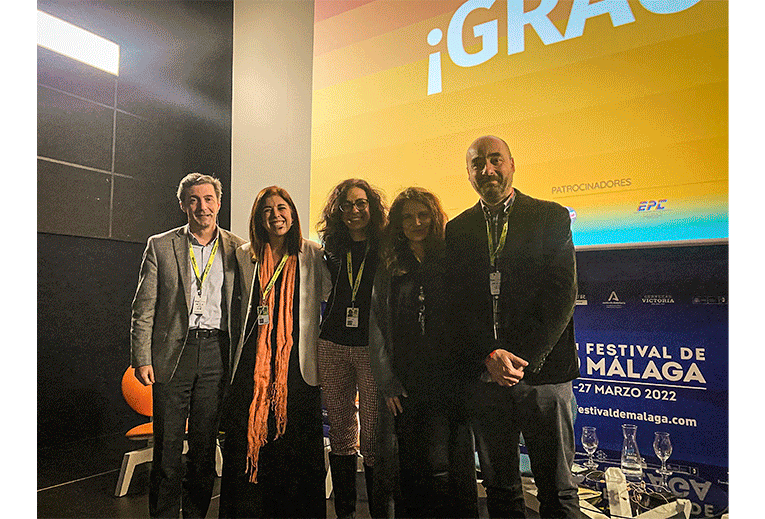
The fourth round table was “Boosting the audiovisual sector”, this institutional meeting was presented by María Jesús Horcajuelo, founder and executive producer of Only 925 and vice-president of APCP.
The participants were: Germán Traver, Head of PR and Senior Location Manager of Palma Pictures, Cristina Morales, Deputy Director General of Audiovisual Communication Services. General Directorate of Telecommunications and Organization of Audiovisual Communication Services. Secretary of State for Telecommunications and Digital Infrastructure, Teresa Udaondo, Deputy Director General for Management and Coordination of Migratory Flows. Ministry of Inclusion, Social Security and Migration, Javier Yraola, Project Manager at ICEX – Invest In Spain. The moderation was in charge of Adriana Piquet, General Director of APCP.
German was the one who began with the first intervention, explaining what a service production company is and how today Palma Pictures is 100% international, not doing projects for nationals, to bring fiction projects as important as The Crown, no doubt having been an advertising service producer facilitated the process, for the experience that generates the sector.
She defined production companies in the audiovisual world as the executors of the creative idea. She talked about the exaggerated growth at the moment and the huge requests for projects that are coming in.
The tax incentive for the service of film and series has put us in the forefront internationally and it is necessary to take some determination to manage this demand that right now is impacted by the lack of technicians.
The evolution in 5 years is incredible, the volume of work is very high and with budgets that a few years ago would have been unthinkable.
Cristina Morales, in June last year, announced in the third edition of the conference that the plan to promote the audiovisual sector had just been approved.
She explained the constant dialogue with all the audiovisual associations and how this plan has helped the sector to internationalize and come to shoot in Spain.
A couple of weeks ago the Audiovisual Hub portal was launched, which aims to be the centralized information point for the sector.
He gave a tour of the portal that you can find here: https://spainaudiovisualhub.mineco.gob.es/es/home
APCP works hand in hand with Teresa Udaondo to explain the timing of work in our sector. We are a world that moves very fast, foreigners will always be an obstacle pointed out, and therefore told that in this last time have wanted to be solutions and not be an obstacle and join the audiovisual.
To achieve these changes they emphasize that it is essential economic data provided by the reports presented by the APCP, where they show the economic impact of our activity and what would happen if not enough is shot.
One of the most significant changes that has been achieved is that audiovisual professionals who come to work in Spain for up to 90 consecutive days can do so without a visa and the same for their families.
The administration tries to ensure that the actions carried out are as tailored as possible and beneficial to the sector. There are still elements to improve, but they are still working to continue in it and with other agents involved.
Javier Yraola from ICEX pointed out that, thanks to the audiovisual sector and the impulse plan, work is being carried out at a more technical level and in a more coordinated inter-ministerial manner.
ICEX has created a department for the audiovisual sector that has two faces, one to promote internationalization and the other to support the attraction of filming and the industry together with other administrations to this flow of people who come to film here.
With the tax incentive for the audiovisual industry, a one-stop shop is being promoted to deal with any matter related to the sector.
Exclusively at the conference, it was announced that ICEX and APCP will go together for the first time at Cannes Lions and it will also be the first year that the Spanish industry will have a meeting point at the festival.
One of the hottest topics in recent months has been the labor reform, being a sector in which a lot of work is done on a project basis, the reform has posed certain obstacles.
German from the part of the production companies reflected on how before we were a sector that was not as professionalized as now, in all aspects, both legally and technically we have had to adapt to these processes.
The administration now understands that this is an industry, and that they have to facilitate our processes, as in the case of migrations.
Adriana pointed out that our industry also needs aid, not only for fiction, but also for advertising. Although aid should not always take the form of a subsidy, the process of streamlining permits, especially those for the entry of foreigners, is an unavoidable aid for the advertising film industry; for us, agility in permit deadlines equals subsidy. But in the advertising service, in these times where we compete with the rest of the planet needs a push and tax incentives could help to capture the business that we are losing.
Talking about tax incentives, if our sector is seen as cultural industries, it is the opportunity that advertising films will have to opt for them.
With the labor reform and the new statute of the artist now in force, we have to row in the same direction of understanding the people who work in the sector as professionals who are dedicated to the audiovisual industry.
We must understand everything as a single audiovisual industry and work with other administrations that are not yet at that point of understanding the audiovisual industry as a large industry and for this it is necessary to know how to read the figures to continue improving conditions and negotiations, it was remarked at the table that it is essential to work together.
Finally, the NIE was discussed, which is one of the elements that is being worked on at the moment and Javier explained that it is a problem that affects many sectors and is structural in nature. A window of opportunity can be opened thanks to the audiovisual sector and many others can benefit thanks to us.
To conclude, the relationship seen at this table between the association of advertising film production companies and public administrations is very important. The clearest way to see this good relationship between them is the fruit of the great changes and improvements that are taking place in the advertising film sector.



